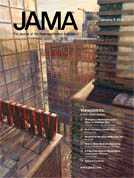JAMA:过度进食时热卡是增加身体脂肪含量的主因
2012-01-06 MedSci原创 MedSci原创
1月4日,发表在JAMA杂志上的一则研究"Effect of Dietary Protein Content on Weight Gain, Energy Expenditure, and Body Composition During Overeating"披露,在一项实验中,25名居住在某个得到控制的环境内的健康人被随机分配过量进食不同含量的蛋白质饮食,与进食正常含量或高蛋白含量饮食者相比,那
1月4日,发表在JAMA杂志上的一则研究"Effect of Dietary Protein Content on Weight Gain, Energy Expenditure, and Body Composition During Overeating"披露,在一项实验中,25名居住在某个得到控制的环境内的健康人被随机分配过量进食不同含量的蛋白质饮食,与进食正常含量或高蛋白含量饮食者相比,那些进食低蛋白含量饮食者的体重增加较少,并且看来仅仅是热卡而不是蛋白质促使了身体脂肪的增加。
研究人员还发现,蛋白质确实促成了能量消耗和瘦体重的变化。根据文章的背景资讯:“肥胖症已经成为一个重大的公共健康问题,在美国有60%以上的成人被归类为超重,30%以上的人则患有肥胖症。”目前饮食结构对过度饮食及能量耗损起到的反应作用尚不清楚。
路易斯安那州巴吞鲁日市的彭宁顿生物医学研究中心的George A. Bray, M.D.及其同事开展了一项研究,旨在确认在严格控制的情况下,饮食中的蛋白质含量是否会不同地影响身体的组成、体重增加,或能量消耗。这一随机对照的试验包括了25名美国的健康且体重稳定的男性和女性志愿者,他们的年龄在18-35岁间,其身体质量指数在19-30间。第一位进入医院代谢病房的试验参与者是在2005年5月,最后一位则是在2007年10月。在进食了某种稳定体重的饮食达13-25天之后,试验参与者被随机指派接受含有5%(低蛋白含量)、15%(正常蛋白含量)或25%(高蛋白含量)的能量来自蛋白质的不同饮食;他们在医院代谢病房中居住的10-12个星期中的最后8个星期内会被要求过量摄取这些饮食。与体重稳定期摄取的能量相比,该蛋白质饮食提供了大约40%的额外能量摄入,相当于每日多摄入954卡。
在该研究中的所有参与者都增加了体重,而且没有呈现性别差异。低蛋白饮食组的体重增加比另外2组显著要少(相对于正常蛋白含量饮食组:6.97磅 [3.16 公斤] vs. 13.3 磅 [6.05 公斤];相对于高蛋白含量饮食组:6.97磅 [3.16 公斤] vs. 14.4 磅 [6.51 公斤])。
文章的作者写道:“在3个不同蛋白量的饮食组中,参与者的身体脂肪的增加都是相似的,它们代表了50%至90%以上的额外储存的热卡。静息能量消耗、总体能量消耗及身体内蛋白含量在过度进食低蛋白含量饮食期间都没有增加。”
研究人员写道:“综上所述,与进食正常含量蛋白饮食(即来自蛋白的能量为15%)时的体重增加相比,在有着相同数目的额外热卡的情况下,进食低蛋白含量饮食(即来自蛋白的能量为5%)时的体重增加效应会有所减弱。但是只有热卡才与身体脂肪的增加有关。相反,蛋白质会造成能量消耗及瘦体重的变化,但却不会造成身体脂肪的增加。”
这项研究的关键发现是:当摄取过多的能量时,热卡比蛋白质对增加身体脂肪含量有着更为重要的作用。(生物谷bioon.com)
Effect of Dietary Protein Content on Weight Gain, Energy Expenditure, and Body Composition During Overeating
George A. Bray, MD; Steven R. Smith, MD; Lilian de Jonge, PhD; Hui Xie, PhD; Jennifer Rood, PhD; Corby K. Martin, PhD; Marlene Most, PhD; Courtney Brock, MS, RD; Susan Mancuso, BSN, RN; Leanne M. Redman, PhD
Context The role of diet composition in response to overeating and energy dissipation in humans is unclear.
Objective To evaluate the effects of overconsumption of low, normal, and high protein diets on weight gain, energy expenditure, and body composition.
Design, Setting, and Participants A single-blind, randomized controlled trial of 25 US healthy, weight-stable male and female volunteers, aged 18 to 35 years with a body mass index between 19 and 30. The first participant was admitted to the inpatient metabolic unit in June 2005 and the last in October 2007.
Intervention After consuming a weight-stabilizing diet for 13 to 25 days, participants were randomized to diets containing 5% of energy from protein (low protein), 15% (normal protein), or 25% (high protein), which they were overfed during the last 8 weeks of their 10- to 12-week stay in the inpatient metabolic unit. Compared with energy intake during the weight stabilization period, the protein diets provided approximately 40% more energy intake, which corresponds to 954 kcal/d (95% CI, 884-1022 kcal/d).
Main Outcome Measures Body composition was measured by dual-energy x-ray absorptiometry biweekly, resting energy expenditure was measured weekly by ventilated hood, and total energy expenditure by doubly labeled water prior to the overeating and weight stabilization periods and at weeks 7 to 8.
Results Overeating produced significantly less weight gain in the low protein diet group (3.16 kg; 95% CI, 1.88-4.44 kg) compared with the normal protein diet group (6.05 kg; 95% CI, 4.84-7.26 kg) or the high protein diet group (6.51 kg; 95% CI, 5.23-7.79 kg) (P = .002). Body fat increased similarly in all 3 protein diet groups and represented 50% to more than 90% of the excess stored calories. Resting energy expenditure, total energy expenditure, and body protein did not increase during overfeeding with the low protein diet. In contrast, resting energy expenditure (normal protein diet: 160 kcal/d [95% CI, 102-218 kcal/d]; high protein diet: 227 kcal/d [95% CI, 165-289 kcal/d]) and body protein (lean body mass) (normal protein diet: 2.87 kg [95% CI, 2.11-3.62 kg]; high protein diet: 3.18 kg [95% CI, 2.37-3.98 kg]) increased significantly with the normal and high protein diets.
Conclusions Among persons living in a controlled setting, calories alone account for the increase in fat; protein affected energy expenditure and storage of lean body mass, but not body fat storage.
本网站所有内容来源注明为“梅斯医学”或“MedSci原创”的文字、图片和音视频资料,版权均属于梅斯医学所有。非经授权,任何媒体、网站或个人不得转载,授权转载时须注明来源为“梅斯医学”。其它来源的文章系转载文章,或“梅斯号”自媒体发布的文章,仅系出于传递更多信息之目的,本站仅负责审核内容合规,其内容不代表本站立场,本站不负责内容的准确性和版权。如果存在侵权、或不希望被转载的媒体或个人可与我们联系,我们将立即进行删除处理。
在此留言








#体脂#
51
#进食#
77